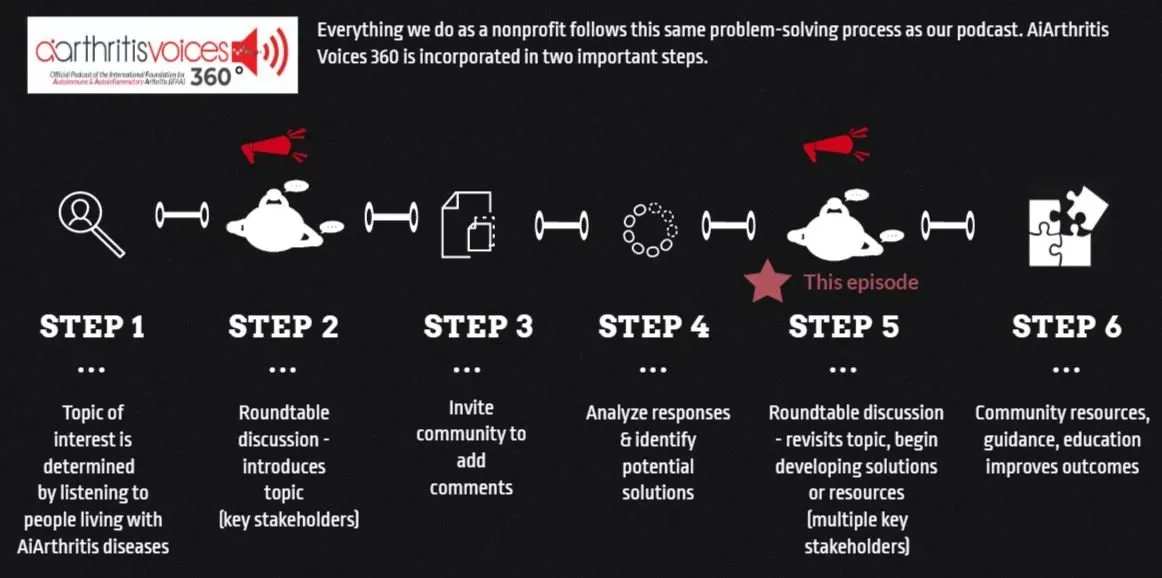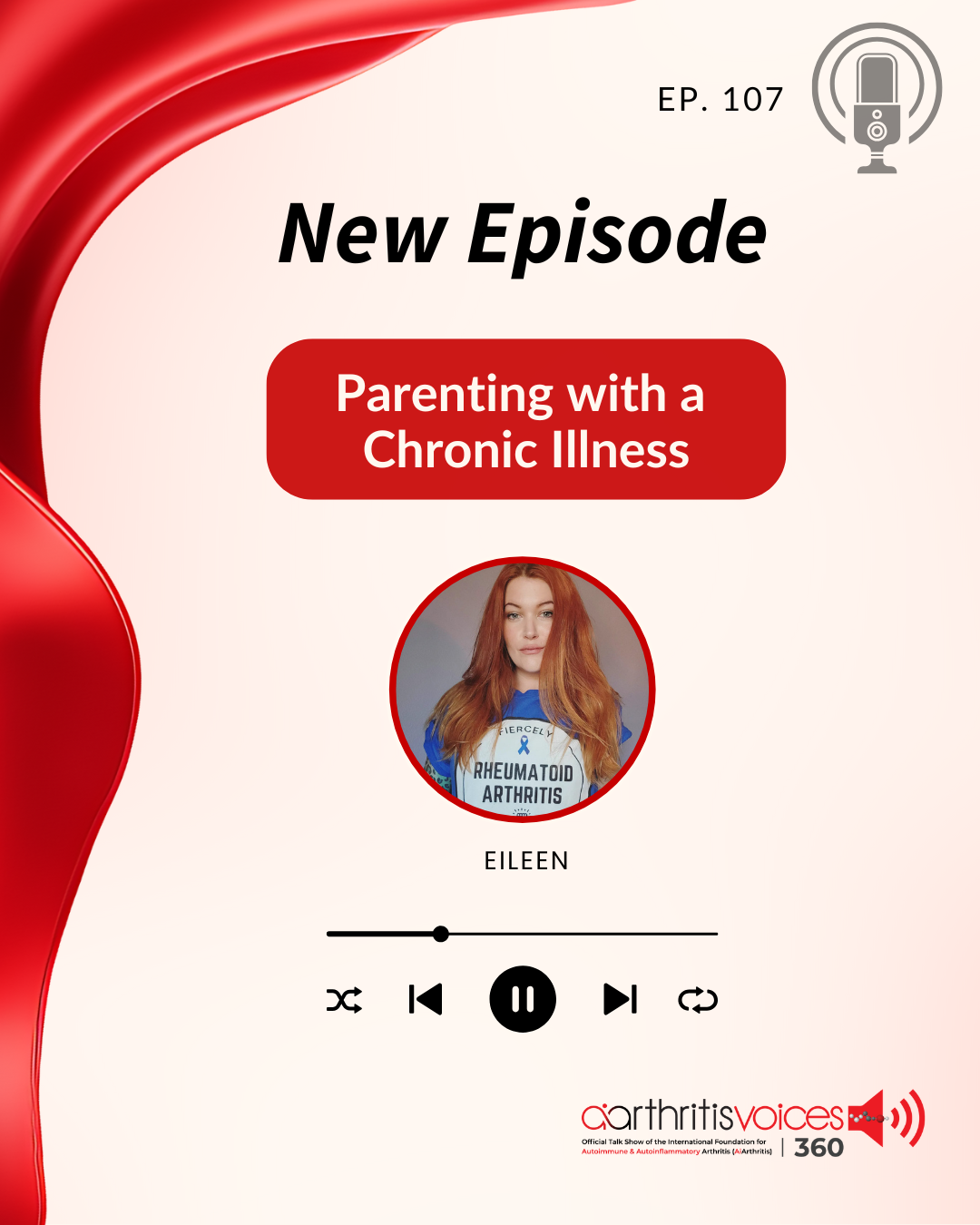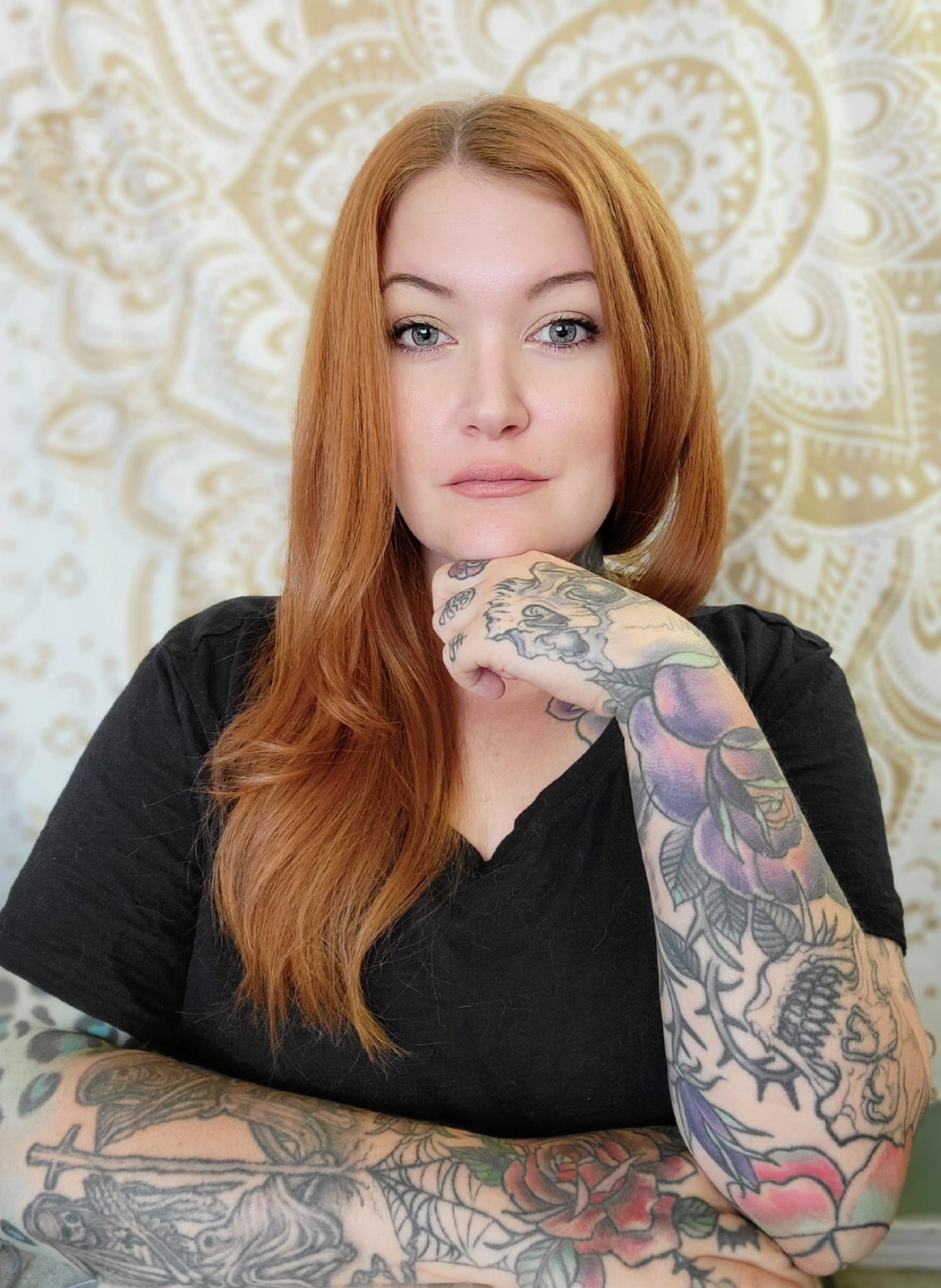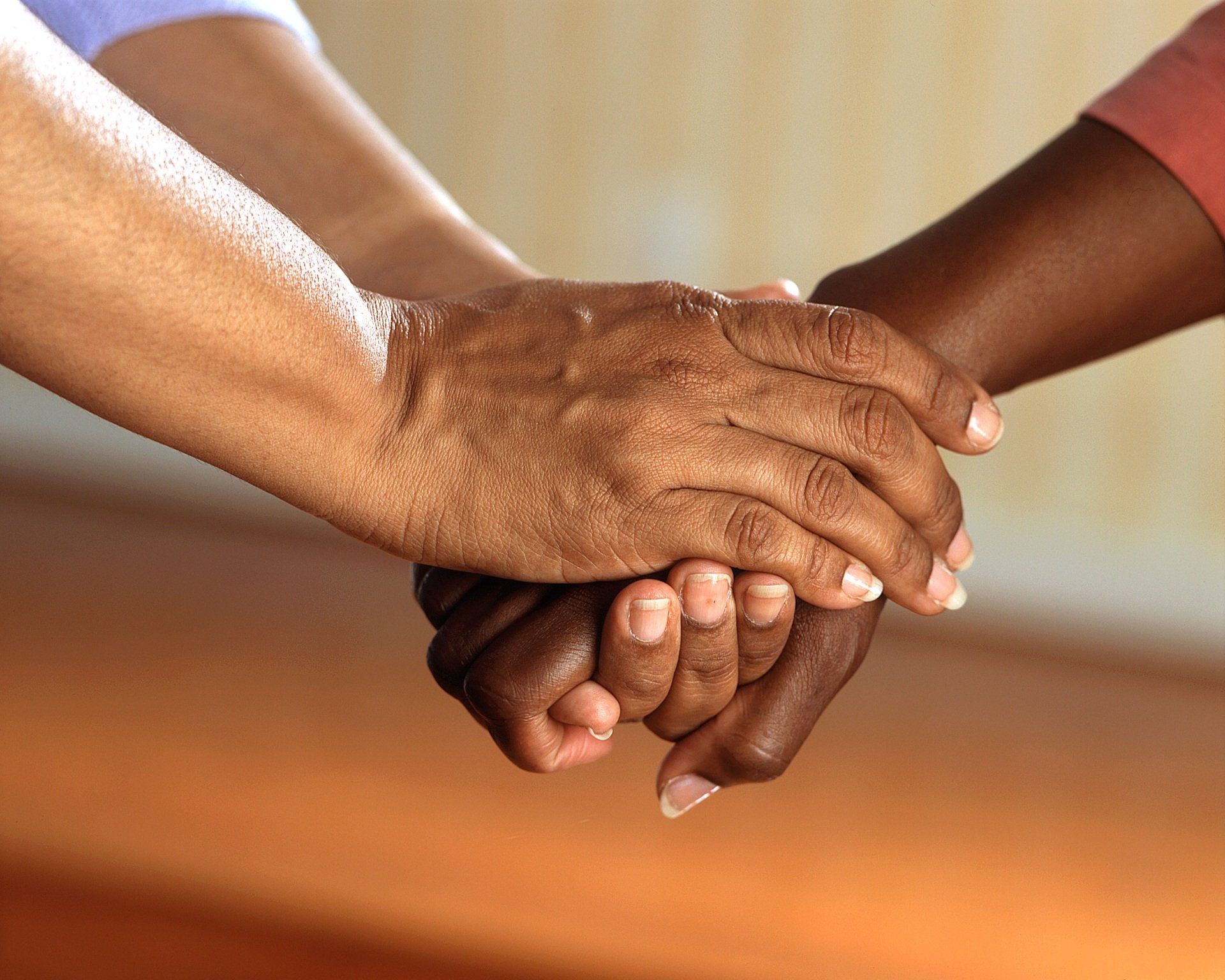AIA 107 Podcast
Intro: [00:00:00] Welcome to AiArthritis Voices 360, the podcast solving today's most pressing issues in the AiArthritis community. We invite you all to the table where together we face the daily challenges of autoimmune and autoinflammatory Arthritis. Join our fellow patient co hosts as they lead discussions in the patient community, as well as consult with stakeholders worldwide to solve the problems that matter most. Whether you are a loved one, a professional working in the field, or a person diagnosed with an AiArthritis disease, this podcast is for you. So pull up a chair and take a seat at the table.
Eileen: Hello and welcome to the AiArthritis 360 Talk Show, the official talk show of International [00:01:00] Foundation of Autoimmune and Autoinflammatory Arthritis. My name is Eileen, also known as Chronic Eileen on the internet. And today I am your host of the this episode and I will be talking about what it's like to parent with rheumatoid arthritis or an autoimmune form of arthritis because it comes with quite a few challenges and we all know that parenting is already quite difficult but when you throw in a mix of having a chronic illness it can make challenges that aren't apparent to a healthy parent.
See my little pun there? So yeah, I'm going to first talk a little bit about my experiences of parenting with rheumatoid arthritis and how the symptoms of this disease can actually make an impact on me. And then I'm going to pause the video for a moment and I'm going to grab my 12 year old son who was hesitantly asked hesitantly agreed to participate in this video.
I have a couple of questions for him. I would like to [00:02:00] ask him so that if there's any other parents who would like to listen to a perspective of a child whose parent is living with a chronic illness or any other children who maybe want to hear a perspective it's an opportunity and also because I think it's important that both perspectives are heard when it comes from this because I know that living with rheumatoid arthritis, it definitely does have an impact on my son, both negative and positive.
I think my biggest struggle living with rheumatoid arthritis and being a parent is that I really struggle with fatigue. I was diagnosed with rheumatoid arthritis when my son was almost two years old and my disease was there before my pregnancy, but after my pregnancy is when it really became apparent that I had something going on.
And it was after my pregnancy that I thought, the swelling would go down, my [00:03:00] mental health would get better, I wouldn't be so tired. I could lose the weight. The pain that I felt during my pregnancy also didn't really go away. I Remember being at work and trying to work as a single mother, too.
I split with my kid's father when he was one. We remain friends, actually very good friends now. So I'm grateful for that. But I am a single parent. So a lot of this is, all the parenting is on my shoulders, which can be a challenge even if I have help some days, there's, Five days, six days of the week, I don't really have help.
And as my son has gotten older, he is my help. I remember when I was about two years after pregnancy, I felt really off. All the symptoms of being constantly fatigued and the reoccurring infections and the brain fog. I [00:04:00] was working as an esthetician and I used to be really good at my job.
Physically I could handle it quite well, but then I couldn't. I was in the back room after each service in tears and yeah, just really struggling. And I remember asking for a rheumatoid arthritis blood test. I was about 29 years old then. This was in 2015, so 10 years ago now. And my doctor told me I was, probably too young and she just brushed me off. We've all experienced medical gaslighting before, but, I'm grateful that I advocated for myself because my test came back positive. I had rheumatoid arthritis and it was things in my parenting that were really apparent to me that I did have something going on because I struggled to hold my son for a long period of time.
I really struggled with the, him constantly, when the babies wake up a lot during the night. I really struggled with that. It would leave [00:05:00] me really fatigued. Of course, I thought that was, just being a new parent, but it was actually affecting me even worse because I had a diagnosed untreated rheumatoid arthritis during, the time when he was a little baby who woke up several times for feeding in the night.
That was really difficult and then like things like strapping him into a car seat or strapping him into a stroller was difficult. And then when he was really young and I was super fatigued, I felt like I needed naps all the time. So I had a lot of guilt around not being as, I guess, involved as a mom as I wanted to be.
All my expectations of parenting went out the window when I was diagnosed with Rheumatoid Arthritis. And I think my biggest issue when he was little was I'd have to put him up on my, while I slept, I'd put him, lie down on the couch, I'd [00:06:00] put him on my lap, and I'd give him a tablet to play with, because I could feel him if he were to get off me, so then I'd wake up, I'm a very light sleeper, thankfully, and I just felt really bad, because I was like in my parenting by throwing a screen at him.
But I had sometimes no choice because I was so fatigued and so tired or so sick or trying to come off, side effects of medications or the extreme depression that also started after my diagnosis too. So there was a number of things that made parenting challenging, especially at the beginning and over time.
Those challenges have changed. My son now 12 is far more helpful and he can take care of himself a lot of the time. I don't need to do as many of the things that I had to do for him when he was a baby, which at times I miss, but then also at times I'm like, my body doesn't want to do that again, [00:07:00] which is 1 of the reasons why I only have 1 child to I, I thought, my body and I struggle this much, I don't want to have another kid. Especially as I get older, my arthritis gets worse. Yeah the challenges have changed over time. Now I see. He gives me a little bit of pushback when I ask for help because he is entering, preteen years and they don't want, mom or dad asking them to do things and he goes up and down with it, sometimes he's very good with offering help right away.
Sometimes he's more hesitant and sometimes he just he does helpful things because he's seen how arthritis has affected me over the years. He already knows, it's ingrained in his head to do some of these things. I'm tired to let me just rest. I'm having a hard time [00:08:00] opening something. He'll open it for me.
I need to bring something downstairs. He'll bring it downstairs for me. Things like that. And sometimes he's even my, own personal cheerleader who will say things like I'll maybe say something negative or say, oh, I can't do that because my pain or I can't help out much. He'll remind me that I do so much more other than, what's physical, I take care of him, I You know, pay for his food, clothing, all that stuff.
So he's very grateful to things that I can do. Now, I guess if I were to have any advice for any parents who are struggling with their chronic illness and parenting. You have to be comfortable with yourself. The first step is to let go of any expectations that you had of what a parent should be like, or what other parents are like.
Don't listen to those parents that go to your kid's school that are not going through chronic health issues, [00:09:00] or they do have a chronic health issue. Maybe it affects them differently than you. We're all living our own unique journey. Don't feel guilty for putting yourself first, because you can't run on empty.
You do need to take care of yourself before you can take care of your little one. You cannot let your battery completely drain. Guilt does you no good. Don't let it consume you. You have to own yourself and your flaws. We can't always be perfect and we might forget to pick our kid up one day because of brain fog or we find that we had to miss a recital or a game or a practice because fatigue was too much or pain was distracting.
So yeah, it's, we can't let that guilt us and we have to own it. We have to take note of how our little ones will also mirror [00:10:00] us. One thing I've noticed about living with a chronic illness is I'm very much interested in, anti inflammatory foods and exercise and living very healthy and understanding how to be healthy.
That has mirrored onto my son, which is really great. I didn't really have that influence as a kid. I didn't know how to eat healthy. I didn't know how to exercise. I didn't have actually the biggest support network while growing up. It was actually really challenging for me after my diagnosis to figure out how to be healthy.
Every day, what I needed to do to take care of myself and manage this disease, some of their practical advice I have is always keep organized, write everything down, develop a routine with rest included in it. You have to pace yourself and delegate tasks and you always go with simple and what works best for [00:11:00] you.
Batch cooking has been a complete game changer for me and meal prepping. Some days I'm just way too tired to cook a meal and if I want to eat something that's particularly healthy that my kid isn't into, for example, he's into, not me, doesn't like beans. I love beans. I can prep some bean dishes for myself or I can prep some healthy meals for him and Instead of having to cook two meals every night.
And you know what? If you're late. If your place is messy, it's messy. You can't be perfect all the time. Bending the rules is gonna happen. Chronic illness is bumpy. So it's okay to just take things as they go. And you know what, it's okay to be overwhelmed and ask for help. I think asking for help has been one of the things that have helped me get through being a parent with chronic illness.
And sometimes you ask for help and you get help [00:12:00] where you least expect it, strangers or coworkers or friends that you connected to years ago, they also live with an invisible illness. And if you're open about it, they might connect with you on a different level now. You always have to advocate for yourself.
Always make sure you're on top of your meds, your appointments, and you're taking care of yourself because again, you cannot pour your own cup from empty. So now I'm going to go get my son and I'm going to ask him some questions about what it's like to live with a mom with a chronic illness and what advice he would have for parents or kids who are also in the same situation.
So now I've brought in my son Jacob who is 12 years old and has always known me to have a chronic illness. I'm going to ask him a couple questions about what it's like to have a parent with a chronic illness. Hi, Jacob. How are you today? Yeah. Awesome. And you want to [00:13:00] say a little thing about yourself?
What you like to do first?
Eileens Son: I like to play football.
Eileen: Yeah. And by football, you mean what kind of football? This is a largely American
European football. All right. Yeah. And do you find that it can be a challenge to play football because you have a parent with a chronic illness? So Jacob, what are some of the challenges that you experience having a parent that has a chronic illness like Rheumatoid Arthritis?
Eileens Son: Many days I feel like I'm really just in the house alone because you're always either napping or sleeping and you also go to bed very late. Early, usually around 7 or 8.
Eileen: So that's really interesting that you say that you feel like you're alone because that's one of my biggest challenges as a parent with a chronic illness.
I always feel like [00:14:00] I'm neglectful because I am so tired all the time and I'm always napping. And I wish I could do more with you, but living with rheumatoid arthritis is challenging and the fatigue is usually what wins. We still have a lot of fun together, right? We have our moments. Yeah. What are your, some of your favorite things to do with me that help us connect and, have fun together?
Eileens Son: I like when we watch movies or also when we go out to yeah,
Eileen: we've been lately doing walks at parks and I really do enjoy those. It's very good for my arthritis and it's nice to see nature. Isn't it? It's very therapeutic and it's going in that I brought up earlier in the episode that I've noticed that a lot of My things that I do for my health, like focusing on anti inflammatory foods and exercise, has brushed off onto [00:15:00] you.
Are you, do you feel like having a pair with a chronic illness has taught you a lot about how to live a healthier life? That's good. What are some of your favorite healthy meals?
Eileens Son: I like when you make the Caesar salad. Yeah,
Eileen: so Caesar salad and tofu is like the easiest meal that I do when I'm feeling fatigued and I don't really have much energy to make a big meal, but I want something that's healthy and not going to break the bank.
Now, how do you explain to your friends and your teachers about your mom's chronic illness?
Eileens Son: I actually have to really explain how much. No.
Eileen: How come?
Eileens Son: Because it's never really gone into public so that usually either in class or with my friends
Eileen: That's
Eileens Son: good.
Eileen: All right, and then how would you [00:16:00] describe it if you had to though?
Ah Hard. Hard? Why did the hard come up first in your mind there?
Eileens Son: I don't know
Eileen: All right. So then if you were to come across another parent who has a chronic illness and is struggling with the guilt that comes with having chronic illness. What would you say to them?
Eileens Son: I would say that their child still wasn't.
Oh. And they should try their best to not fall sick.
Eileen: Is that a hint?
Eileens Son: Maybe.
Eileen: All right. And then if you come across another kid who has a parent that has a chronic illness, what would you, what advice would you give them?
Eileens Son: I would say so if they go to bed or something [00:17:00] very early, I suggest, this is what I do. I just go to bed as well.
So go to bed when the parents go to bed. Yep. And then I don't know if it's with any other parents, but my mom, she wakes up very early. So if I go to bed, same time as her. I'll wake up by around the same time as
Eileen: her. One of my challenges lately is especially in the winter, I get very tired in the evenings early and I'm talking around it's actually 4 PM now. So I'm tired and I have coffee. And it is hard to stay awake later in the evening. But sleep hygiene is a whole other topic we can do another episode on. What are your, some of your favorite physical activities to do other than trails? What else do you like to do?
Or do you find that you have to do because you have a parent with a chronic illness?
Eileens Son: I have to go to the trails. My feeling is you're my parent.
Eileen: Yeah.
Eileens Son: [00:18:00] But I wouldn't say that.
Eileen: Okay, if we go take out fun things, but what are things that you find that you have to do because you have a parent with a chronic illness that might be different than your other classmates or other kids that maybe don't have a parent with a chronic illness.
This might look do you like you're 12 and you know how to cook your own food some stuff. Anyways.
Eileens Son: Yeah, I'm not the best. I can. I mostly make like also cereal.
Eileen: Yeah, but you can make toast and your sandwich and
Eileens Son: those are easy things.
Eileen: Yeah. And do you think that's useful for kids to have an understanding how to do and a good way for them to help parents that maybe you're not feeling well in the evening to be able to make their own food.
Eileens Son: I think so.
Eileen: Yeah. And then what else do you have to do to help me out a lot?
Eileens Son: Clean up and also help you with the dishes as you get very tired. You also, you can, but it's very tiring. You, I need to help you bring the laundry up and down from [00:19:00] the stairs.
Eileen: And why do you think it is that I need help with the laundry lifting it up and down the stairs?
Eileens Son: Because Your legs, they're not as strong as the average person.
Eileen: And
Eileens Son: my hands. All your hands are low.
Eileen: Yeah.
Eileens Son: I forgot about that.
Eileen: Yeah. It's, I appreciate that you do that for me because it is little things like that, that you do to help around the house that has significantly made my life.
And managing rheumatoid arthritis easier, so I really appreciate that you do those things. Thank you. You're welcome. Thank you, everybody. Yeah. Alright, Jacob. Thank you so much for having this chat with me today and being a part of this podcast episode. I'm pretty sure that there will be somebody out there who will listen to this and feel seen and heard and less alone.
Any last words? Bye. [00:20:00] Thank you so much for joining us today, and I hope that you have a comfortable evening and get to spend some time with your little ones.
Intro: AiArthritis Voices 360 is produced by the International Foundation for Autoimmune and Autoinflammatory Arthritis. Find us on the web at www. aiarthritis. com. Also, be sure to subscribe to this podcast and stay up to date on all the latest AiArthritis news and events.















